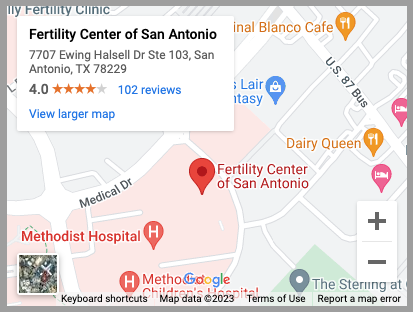Discover Your Path to Parenthood Today.
Improve Your Chances of Becoming Pregnant with Comprehensive Fertility Evaluation Services
It is possible to test your embryos, produced by in vitro fertilization, to ensure they have the correct number of chromosomes PGT-A, (formerly PGS) or for the presence of specific single genes that can cause disease PGT-M (formerly PGD). To do this, embryos are grown to a stage called the blastocyst, which takes five or six days. Several of the embryos cells are removed during a microscopic surgical procedure, known as embryo biopsy, and these are then analyzed by a specialty genetics laboratory. Your doctor can then transfer embryos knowing they contain the normal number of chromosomes, increasing your chance for pregnancy.
Contrary to historical notions, infertility is not strictly a female problem and involves the male approximately half of the time. Male infertility has a variety of causes including endocrine disorders, obstructions in the reproductive tract, genetic issues and abnormalities in the sperm cells that are produced. Most forms of male factor infertility can be treated and all initial infertility evaluations include a semen analysis. In this test, the semen sample is analyzed for volume, sperm count, the quality of sperm movement, the shape of the sperm and the presence of potential fertility-impairing antisperm antibodies. With current methods, most men with male factor infertility can still father children via in vitro fertilization.
Regardless of your sex, hormones play a significant role in your ability, or inability, to procreate. Hormones are regulatory substances that stimulate action in your body’s cells and tissues, and they must be balanced for the body to operate properly. Certain hormone imbalances can contribute to infertility, such as luteal phase defect, and hormone testing allows us to detect and treat these issues with a customized hormone treatment plan.
Your supply of eggs, or ovarian reserve, dwindles consistently throughout your life, beginning even before birth. As a woman ages, the number of eggs she carries diminishes until, later in life, the last of her eggs are depleted and menopause begins. An evaluation of the ovarian reserve is vital to effective fertility diagnostics, and measures the number of eggs a woman currently carries. If a woman’s ovarian reserve is significantly low, she may be a candidate for in vitro fertilization using donated eggs.
If you experience abnormal uterine bleeding, or if you are having difficulty conceiving, a hysteroscopy can allow your doctor to view the inside of your uterus to inspect for signs of abnormalities. A hysteroscope is a thin tube with a light and camera attached to it that provides a clear and concise picture of your uterine wall. Hysteroscopy can also allow your doctor to operate immediately, if necessary, by inserting small surgical instruments through the hysteroscope.
Andrology refers to the study of issues specific to men, and includes semen and hormone analysis to evaluate male fertility. Embryology is the study of fertilized eggs and their progression as they become fetuses. Our on-site andrology and embryology laboratory allows us to perform infertility analyses, as well as fertilize and cultivate embryos until they are ready for implantation, all within the same fertility center. Performing comprehensive diagnostic tests on-site shortens the time our patients have to wait for results, and allows us to prescribe treatment sooner.
Two or more pregnancy losses before 20 weeks is known as recurrent miscarriage. This condition can be caused by your age, your genes, or your lifestyle. It is our goal to help you carry a pregnancy to term. We can perform a thorough evaluation and recommend effective treatment for you.











